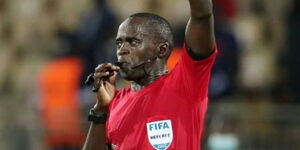In Kenya, politics and leadership are often perceived as a dangerous undertaking, primarily dominated by men, and unfavourable for women.
Furthermore, male dominance of political scene as a result of gender stereotyping, has presented significant barriers for women seeking leadership positions in Kenya.
At independence in 1963, there were no women in Kenyan parliament. The first woman was elected to parliament in 1969.
GRACE ONYANGO
Grace Onyango was a trailblazer. She was initially the Mayor of Kisumu in 1960, before her election as a Member of Parliament for Kisumu in 1969 making her the first female Member of Parliament in the history of Kenya. At the same time, she was also the first female Deputy Speaker in the parliament.
In a past interview, in 2018, Grace Onyango, noted that before venturing into politics, she had been told that for a woman it would be difficult as it was an all-men field.
"I was told by one of the members of parliament, if one was seen to be alone and weak, then people would be abusing you and you will be crying all the time, but one should not cry." You should show them that you can work," Onyango noted.
Grace Onyango argued that women should not wait for nominations but should strive also to work with the men who are elected.
RUTH HABWE
Ruth Habwe was also among the first women to run for elective office in 1964. She came face to face with strong opposition as she was suspended from the independence party KANU and forced to vie as an independent candidate.
It is noted that some MPs told her to “go back to the kitchen and cook for her children,” but despite that, she continued advocating for an equal political space.
Ruth however, was not successful in her quest for the parliamentary position but later became the Maendeleo ya Wanawake Secretary General from 1968 to 1971.
WAMBUI OTIENO
In 1969, Wambui Otieno vied for the Lang'ata parliamentary seat but lost because of different reasons, including ethnocentric politics that was quickly taking shape.
Wambui had been encouraged to leave her husband or at least separate from him during the election period to clinch the parliamentary seat, but she trashed the idea.
“I could be a successful candidate only if I abandoned my Luo husband. When this information was conveyed to me, I felt very dejected. All that I had done was now being measured by my marriage to SM. I had to make a decision, and quickly. I sent the messengers back with the answer that since Parliament was not going to be my husband after the five-year term was over, I had no intention at all of divorcing my husband” Wambui Otieno stated at a past interview.
JAEL MBOGO
In 1969, Jael Mbogo contested against the then Finance Minister Mwai Kibaki, giving former president Kibaki a run for his money though she did not win.
“My task was more critical as I was going against a cabinet minister and a minister for finance and here I was, did I have any money? The answer is no, but I had myself with the people,” Jael Mbogo stated in an interview.
Recently on October 20 ,Mbogo stated that she was saddened by the fact that no woman is vying for the country's top seat in the forthcoming general election.
“When I read the list, it is an all men battle to go to State House, where are the ladies and they are the ones I have been vouching for? I thought I would not die before I see a woman president in Kenya, but they are letting me down,” Mbogo stated.
Another pioneer female woman to vie for a political seat during the post-colonial era was Beatrice Kanini Nyaga. She was known for her strong opposition to the governance of the late Mzee Jomo Kenyatta’s regime.
According to parliament records, between 1963 and 2012, Kenyan voters elected 50 women against 1806 men to parliament.












